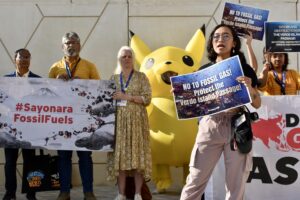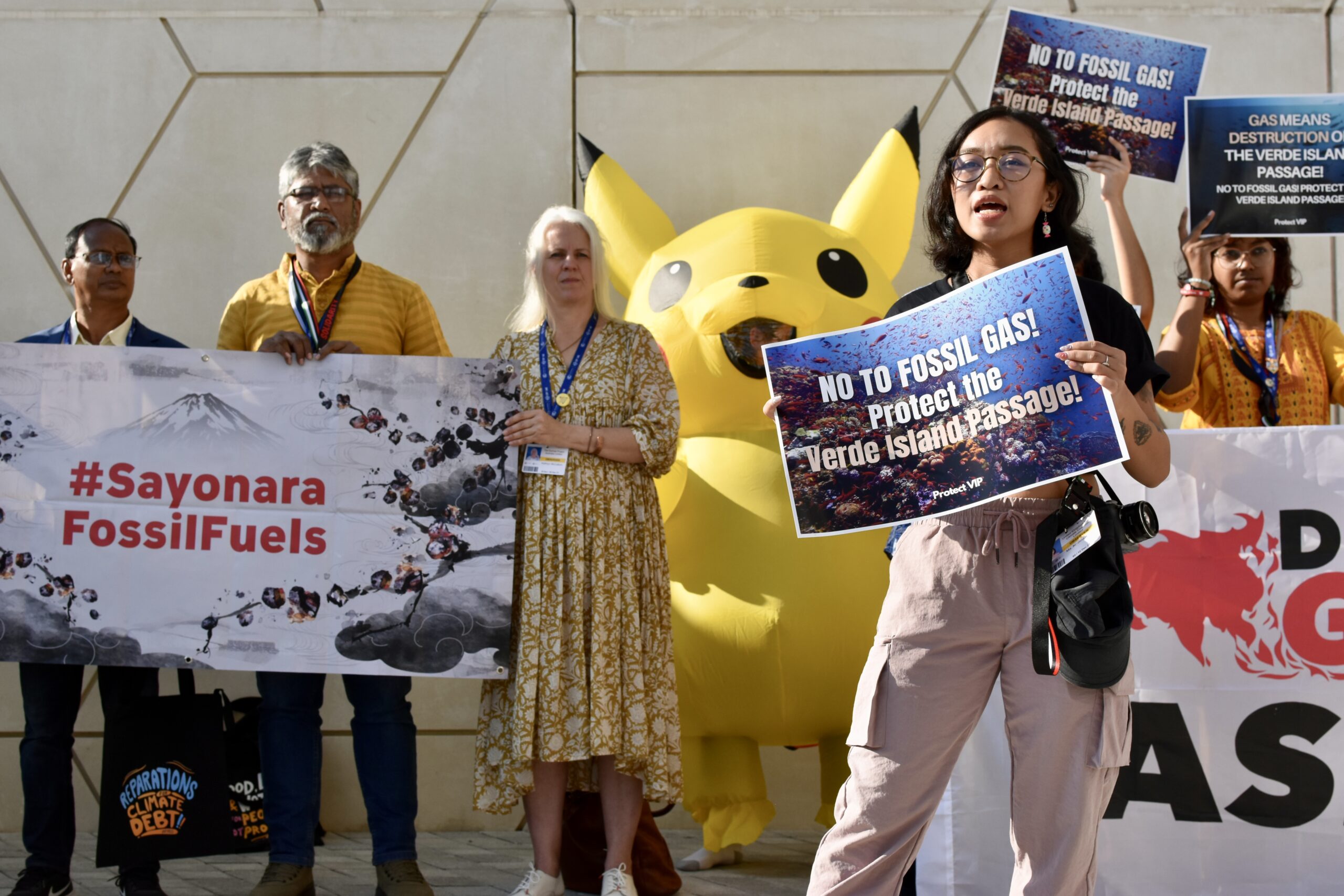
The dust has barely settled following COP28’s historic agreement which sent a long overdue signal on the end of the fossil fuel era.
“After decades of evasion, COP28 finally cast a glaring spotlight on the real culprits of the climate crisis: fossil fuels. A long-overdue direction to move away from coal, oil, and gas has been set,” said Harjeet Singh, Head of Global Political Strategy at Climate Action Network International. “Yet, the resolution is marred by loopholes that offer the fossil fuel industry numerous escape routes, relying on unproven, unsafe technologies.”
The glaring loopholes in the COP28 agreement which activists say will allow the expansion and continued use of fossil fuels will likely be fully exploited this coming weekend as the embattled Japanese Prime Minister Fumio Kishida, embroiled in a corruption scandal, prepares to host Asia Pacific leaders for the ASEAN-Japan 50th anniversary commemorative summit and Asia Zero Emissions Community Summit in Tokyo.
During his COP28 speech, Japanese Prime Minister Kishida promoted the Asia Zero Emissions Community (AZEC), a framework for encouraging governments in the region to increase reliance on LNG and other fossil-based technologies in their own national decarbonization and energy plans.
At COP, Pikachu-clad activists called on Japan to end financing for fossil fuels, organizing a demonstration on “Finance Day” to demand that the Japanese government stop financing new fossil fuel projects and shift support to renewable energy.
Check out this incredible video from our #COP28 action featuring activists from the US, Bangladesh, Philippines, Australia and Japan calling on @JPN_PMO to say #SayonaraFossilFuels. @ASEANjapan50 #AZEC pic.twitter.com/ry8Ik1GSlJ
— Susanne Wong (@susanneir) December 12, 2023
The activists pointed out that despite the urgent need to phase out fossil fuels, Japan is driving the expansion of liquified gas (LNG) and other fossil-based technologies like ammonia co-firing across Asia and globally. Japan is the world’s second-largest provider of international public finance for fossil fuels, according to a new backgrounder by Oil Change International.
Japan spent at least USD 6.9 billion on new oil, gas, and coal projects each year on average from 2020 to 2022. Japan is also the world’s largest provider of international public finance of fossil gas and has been driving the expansion of gas across Asia and globally.
There is no doubt that the Japanese delegation at COP would have been pleased with the weak language, loopholes, and emphasis on false solutions such as carbon capture coming from Dubai. The many loopholes of the COP agreement play right into Japan’s dirty plans for Asia.
Japan is hosting a 50th anniversary summit with the Association of Southeast Asian Nations (ASEAN) as well as the Asia Zero Emissions Community (AZEC) summit starting on December 16-18 in Tokyo, bringing together heads of state from across the region.
There is overwhelming evidence that Japan is working to derail the energy transition in Asia, doubling down on dangerous distractions that rely heavily on fossil fuels, despite our climate emergency.
Can Japan's influence in Asia's energy sector become a force for positive change?
By shifting the US$4.3 billion it spends on fossil fuels to wind and solar, Japan can lead a clean energy shift. #SayonaraFossilFuels.https://t.co/KMDsqhtiIq pic.twitter.com/hG5OiiqHFU
— Fossil Free Japan (@FossilFreeJapan) December 14, 2023
According to media reports, the outcome document for the AZEC summit will include agreements on gas as a “transition fuel” and the roles of ammonia and hydrogen, emphasizing the “diverse and realistic pathways to decarbonization based on national circumstances.” This is just code meaning Japan will continue using fossil fuels.
Civil society groups across Asia will be holding actions on December 15, calling on ASEAN leaders to reject Japan’s dirty energy plans for the region. They are not alone. Experts, think tanks across Asia, ASEAN politicians, and other governments have expressed concerns over the ineffectiveness and danger of technologies promoted through AZEC.
Moreover, it was nearly a year ago that the Japanese government unveiled the Green Transformation (GX) Basic Policy.
Japanese Prime Minister Kishida has admitted that the premise of the GX policy is “decarbonizing while still using fossil fuels” and has worked to paint the energy transition as different, requiring a “realistic transition” that uses all available options.
Japan’s support for fossil fuels in the region is causing significant harm and suffering. Just days ago, the World Bank warned that climate change poses major challenges to environmental stability, economic growth, and human development in the East Asia and Pacific region.
The Bank pointed out that “The region is home to some of the most vulnerable countries in the world to climate-related extreme weather events and impacts such as sea level rise pose an existential threat to the many small island countries in the region. Without concerted action, between 3.3 million and 7.5 million people could fall into poverty by 2030.”
Raoul Manuel, a member of the Philippine House of Representatives, representing the Kabataan party list, warned this week that events such as Typhoon Haiyan or Typhoon Yolanda, which killed over 6,000 Filipinos ten years ago, were becoming more common.
Read @iamRaoulManuel's op-ed @NikkeiAsia on how Japan’s energy plans for @ASEAN countries will put the 1.5 target out of reach. Time for ?? to say #SayonaraFossilFuels! #FossilFreeJapan https://t.co/vwt8Rgco1q
— Fossil Free Japan (@FossilFreeJapan) December 12, 2023
“At this week’s summit, ASEAN politicians should not fall for Japan’s guise of friendship. They should reject Japan’s fossil fuel-based technologies and ask Tokyo to step up and show climate leadership by pushing its money toward renewable energy, said Manuel. “This is a strategy that would actually align with the 1.5 C target and give Southeast Asia its best shot at avoiding further climate disasters.”
He added that “as one of the world’s top economies, Japan bears a historical responsibility for the climate devastation experienced by local communities around Asia.”
Manual cautioned that if Japan does not radically shift its funding toward renewable energy, and “the temperature rise in Asia exceeds 1.5 C, the consequences will be dire. Heat waves, wildfires, floods and droughts will become more frequent and intense and irreparable damage to our ecosystems and lives will inevitably ensue.”
Activists and movements are gearing up across Asia to send a clear message to Prime Minister Kishida to say “Sayonara Fossil Fuels” and stop derailing the transition to renewable energy. To learn more, visit https://fossilfreejapan.org/campaigns/asean/.

